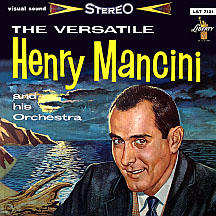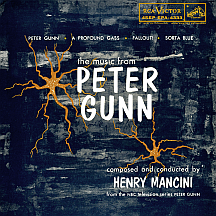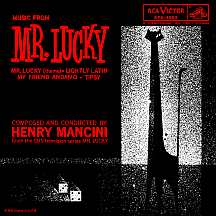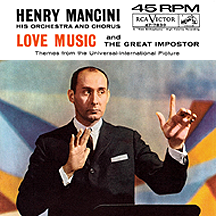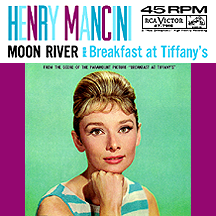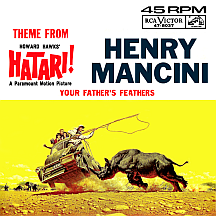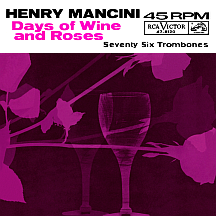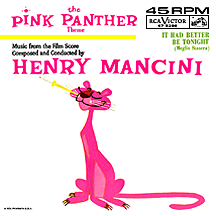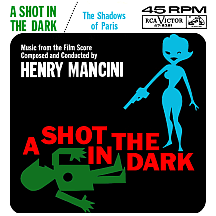HENRY MANCINI
The Mancini Generation, a syndicated TV series that premiered in 1972, was hosted by none other than the man himself, award-winning composer Henry Mancini, and featured instrumental 40-man band versions of standards from pop hits to movie themes to classical overtures as well as originals composed by the series' star. After a brief run the show was canceled, perhaps having come a bit too late to appeal to the tastes of an audience that several years earlier would have more readily embraced a program perceived as cooler than The Lawrence Welk Show but not as cool as rock and roll. But there's a ring of truth to the short-lived series' title; the period from the late '50s through early '70s could easily be seen as an era defined by Mancini's music. His compositions permeated pop culture during those years, if often in subtle ways. He created literally hundreds of music scores, gaining acclaim, fame and fortune for television themes like Peter Gunn and Mr. Lucky and movie music for Breakfast at Tiffany's and The Pink Panther among many, in addition to occasional non-big- or small-screen recordings, supplying a daily music backdrop for tens of millions of people falling within that particular generation.
His less-than-spectacular beginning in Cleveland, Ohio hardly hinted at great things to come. Born Enrico Nicola Mancini in 1924, he grew up in Aliquippa, Pennsylvania (near Pittsburgh) and was accepted at New York's Juilliard School of Music at age 18, though a call from the U.S. Army at World War II's peak period limited him to a single year at the prestigious school. After the war he played piano with a reconfigured Glenn Miller Orchestra led by Tex Beneke (Miller had been among those classified as missing in action). In 1951 he married Ginny O'Connor, a singer with Mel Torme's group The Mel-Tones, then went to work for Universal Pictures a year later, beginning a long tenure composing incidental and mostly-uncredited music for B films (there were several in the Abbot and Costello series) including some of the cream of the crop of '50s horror flicks (It Came from Outer Space, The Creature from the Black Lagoon, Tarantula, The Deadly Mantis, Monster on the Campus and the list goes on).
In the midst of all this low-budget fun, Hank landed a prime assignment; he and Joseph Gershenson collaborated on the adapted music score (with some original flourishes) for 1954's The Glenn Miller Story starring James Stewart, receiving an Oscar nomination for their effort, Joe's first of two and Henry's first of 18, an accomplishment few can boast. As priority projects alternated with continued B movie work, he began making records. Signed by Liberty, his albums (Driftwood and Dreams and The Versatile Henry Mancini) consisted mostly of well-worn standards by other composers (though Laurindo Almeida's guitar contribution to the former LP added to its appeal).
There were two singles on Liberty: "Four Girls in Town" from the movie score composed by Alex North and Mancini's own "Big Band Rock and Roll," sounding exactly as the title suggests, from the 1956 Sal Mineo vehicle Rock, Pretty Baby. He worked with Gershenson on Orson Welles' 1958 noir masterpiece Touch of Evil, composing the music while Joe conducted the orchestra, setting an appropriately dark sonic ambience; "Tana's Theme," created for Marlene Dietrich's fortune teller character in the film, was released as a single on Coral, though the soundtrack album was on Challenge.
Shortly afterwards he settled into a longstanding arrangement with RCA Victor Records with a television score and dynamic theme that provided his career breakthrough. "Peter Gunn Theme," its signature guitar riff set against a definitive "crime sound" big band backing, set the tone for the NBC series that debuted in the fall of '58, created by Blake Edwards and starring Craig Stevens as the title character and Lola Albright as his gal-pal. At first it seemed bandleader Ray Anthony had grabbed the glory, as his cover version on Capitol was rushed to radio and became a top ten hit in early '59, but Mancini gained the most benefit from his composition; his Music from Peter Gunn album racked up ten weeks at number one, sold over a million (one of the biggest of all TV soundtracks), won two Grammys including Album of the Year and spawned a top-selling follow-up, More Music from Peter Gunn. He had rapidly risen from the position of mostly-uncredited film composer to household name.
Literally hundreds of scores for TV and big screen productions followed, many of them high-profile. "Mr. Lucky," his theme from another Edwards series starring actor John Vivyan in his most notable role, took a lush approach with strings, horns and organ in contrast to the tougher-sounding Gunn tune; this time Henry had the single release, his first-ever top 40 hit in the spring of 1960, resulting in two more Grammys (he had also won the previous year for his jazz album Blues and the Beat, bringing his total to five awards and counting).
The team of Edwards and Mancini was successful on both artistic and commercial levels. Television had been Blake's bread and butter, but that changed with one meal: Breakfast at Tiffany's. Audrey Hepburn's image is historically centered around her portrayal of Holly Golightly in this huge hit 1961 film that picked up five Academy Award nominations; Mancini won two Oscars, one for Best Scoring of a Dramatic or Comedy Picture and the other for the Best Original Song, "Moon River," cowritten with Johnny Mercer. Hepburn sang the song in the film, its lyrics ('...waitin' 'round the bend, my huckleberry friend...') starkly contrasting the film's urban New York setting. Mancini's version (featuring a chorus of singers) was a hit, spending five months on the charts from October '61 to March '62, then reappearing in May and June and making a return to the top 40 while the soundtrack album dominated the top spot on the album charts. The excessively sentimental song is closely associated with other artists as well; Jerry Butler's version became one of his biggest hits at the same time as Mancini's and Andy Williams used it as the lead track on his million-selling album Moon River and Other Great Movie Themes.
Edwards and Mancini worked together on a regular basis for more than 20 years, but it wasn't an exclusive arrangement by a long shot. Henry's subtle-but-powerful music for Hatari!, the 1962 adventure-comedy-drama set in Africa, directed by Howard Hawks and starring John Wayne and former model Elsa Martinelli, was well received and anchored his fifth top ten album. An unexpected development occurred when the film's "Baby Elephant Walk" caught on, gaining radio play for versions by Lawrence Welk on Dot and The Miniature Men, a studio group headed by Hank Levine, on Dolton.
In 1963, the score and theme (again using chorus singers) from Days of Wine and Roses, Blake's take on the pitfalls of alcoholism starring Jack Lemmon and Lee Remick, landed the composer back in the top 40 of the singles charts, competing with Williams' hit vocal rendition; the result was his third Oscar win (second for Best Original Song). Similarly, his moderately-paced vocal group theme from Charade, the Stanley Donen-directed thriller starring Hepburn and Cary Grant, landed in the top 40 and nabbed him an Oscar nom; a few months later, Sammy Kaye's energized instrumental arrangement of the tune reached the top 40 as well. Mancini later composed the music scores for Donen's mid-'60s films Arabesque and Two For the Road.
One of Hank's career peaks will be forever attached to the image of an extremely popular cartoon character introduced in the first of Peter Sellers' Inspector Clouseau comedies. The theme song from Edwards' 1964 film The Pink Panther was just the start; the fuschia-hued cat was too clever a creation to be limited to an animated title segment in a single film; a cartoon, The Pink Phink, with Mancini's theme playing throughout the seven minute short, appeared in theaters later in the year and was a surprise winner for producer David H. DePatie and director Friz Freleng (a former Disney artist and long-term animator for Warner's Looney Tunes and Merrie Melodies) in Oscar's Cartoon Short Subject category. It led to more than a hundred Pink Panther shorts that were produced through 1980 (and aired on children's TV shows long afterwards), all with Mancini's insistent and ultimately ultra-famous theme.
A Pink Panther sequel starring Sellers, A Shot in the Dark, had a fresh new theme by Henry and made it to theaters within a few months of its predecessor. His theme from the Glenn Ford-Geraldine Page romance Dear Heart hit the charts but was overshadowed by Andy Williams and Jack Jones, who both reached the top 40 with versions of the song. Johnny Mathis attempted a similar play with "The Sweetheart Tree" from Edwards' The Great Race the following year. Mancini's record sales fell off around that time, though he had minor hits with the instrumental themes from George Roy Hill's Hawaii in 1966 and Terence Young's Wait Until Dark in 1967.
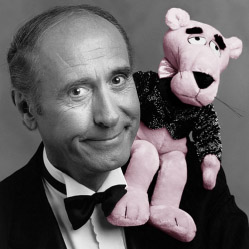
Prolific is hardly a strong enough word for Mancini's talent or work ethic. His music graced a dozen or more movies or TV presentations each year throughout the 1960s and '70s, while in between he made albums and singles that were often non-film related. As the '60s progressed, RCA Victor released his recordings of instrumentals by other composers, some of them classic works, others cover versions of then-current hits or themes. Strangely enough, he had the biggest hit of his career with one such record. Italian composer Nino Rota's "(Love Theme from) Romeo and Juliet," from director Franco Zeffirelli's slightly more daring big screen take on the classic William Shakespeare story, was the right song at the right time (and it didn't hurt that instrumentals in general, after a downturn in popularity mid-decade, were again riding high on the charts). Mancini's soft piano version became his only number one single in June 1969.
He followed his chart-topper with a pop remake of Ludwig van Beethoven's 1801 piano piece "Moonlight Sonata," then entered the '70s with other popular themes like "Life Goes On" from Z, the Algerian Oscar winner for Best Foreign Film and "(Theme from) Love Story" from the much-loved soaper that established Ali MacGraw and Ryan O'Neal as movie stars; the latter was Mancini's last major hit in early 1971. His mantle had become overrun with 20 Grammy statuettes, making him the music award's biggest winner up to that time. He stayed busy writing, recording and enjoying his status as a well-known entertainment industry personality, a luxury many of his composer contemporaries didn't have...or in some cases didn't care about. In '77 he had a minor hit with the Charlie's Angels TV theme and he won his fourth Oscar in collaboration with Leslie Bricusse for the score of the 1982 musical Victor/Victoria, another feather in Blake Edwards' cap. Henry Mancini worked consistently right up until his sudden death in 1994, leaving behind a body of work so deep that it would take years just to listen to it all. But smaller doses of his music are all it takes to capture that "Mancini Magic."
NOTABLE SINGLES:
- (Main Title from) Four Girls in Town - 1957
- Big Band Rock and Roll - 1957
- Tana's Theme - 1958
- Fallout! - 1959
- Peter Gunn Theme - 1959
- Mr. Lucky - 1960
- (Theme from) The Great Impostor - 1961
- Moon River /
Breakfast at Tiffany's - 1961 - Experiment in Terror - 1962
- (Theme from) Hatari! - 1962
- Days of Wine and Roses - 1963
- Banzai Pipeline - 1963
- Charade - 1963
- The Pink Panther Theme /
It Had Better Be Tonight - 1964 - A Shot in the Dark - 1964
- Dear Heart - 1964
- The Sweetheart Tree - 1965
- Hawaii (Main Title) - 1966
- Two For the Road - 1967
- Wait Until Dark - 1967
- (Love Theme from) Romeo and Juliet - 1969
- Moonlight Sonata - 1969
- (Theme from) Z (Life Goes On) - 1970
- (Theme from) Love Story - 1971
- (Theme from) Charlie's Angels - 1977


